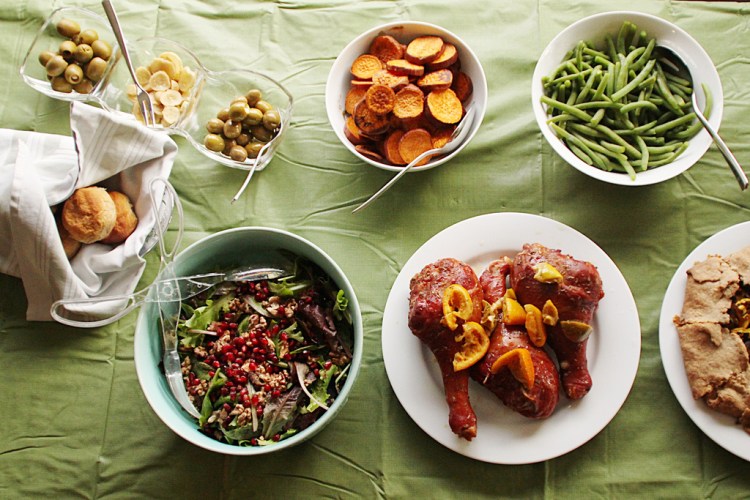Home-rental network Airbnb is quietly experimenting with a plan to turn homes into restaurants. According to Reuters, the San Francisco pilot project will let diners eat at a local resident’s home for $25 for a 3-course meal.
I see a lot of tech products, but I could not be more excited to see this project come to fruition.
Here are three ways it could make dinner experience in big cities cheaper, more neighborly, and tastier.
More affordable dining
Airbnb’s potentially disruptive experiment could make cities a lot more affordable and more neighborly. In the increasingly gentrified neighborhood of San Francisco’s Mission district, a a fixed-price 3-course meal at a restaurant is around twice that price (plus tip). Even worse, the rising costs of living here are pricing long-time locals out of the very neighborhoods they’ve spent so many years.
At $50 or more a pop, it would take the average worker in San Francisco an entire day just to eat out on the hip Valencia Street corridor that has become a mark of how tech wealth is transforming the city.
“There’s less crime, which is good; rents are insane, which is very very very bad,” one bookstore clerk, who has lived in San Francisco for 25 years, told me. “And, there’s more restaurants, which is sort of neutral because I can’t afford to eat at most of them,” he joked, with a mix of levity and melancholy.
Economists have found that rising income inequality has generally mirrored consumption inequality [.pdf]. That is, while it is true that some items are getting cheaper for everyone, dining out is especially sensitive to changes in income (in other words, it has what economists call “elasticity”).
One of the delights of a city is experiencing the food — and in that, AirBnB could be a great equalizer.
Getting outside the echo chambers
Pricing out long-time residents is bad enough. But, the chic, restaurant-filled rows of San Francisco have become a gentrifying dividing line; in the heart of the Mission District (the site of many Google bus protests), poverty and yuppy-ville co-exist half-a-block apart. Mission Street is riddled with drugs, prostitution, and violence, while cozy Valencia Street, one block away, is lined with the newest (and most expensive) restaurants. These chic shops have separated the neighborhood into a socio-economic oil and water.
Here’s where Airbnb could make a dent: Restaurant AirBnB “houses” could broaden the scope of where SF residents and tourists would dine. Not only will they meet more neighbors, but they’ll see more of the city that they are inadvertently reshaping.
Indeed, in more collectivist nations, hosting dinner at a stranger’s house is part of the culture. When I traveled in the poorer parts of Brazil, I would regularly get invited to dinner with a simple phrase: “Quer Churrasco?” (Want BBQ?). It was the locals’ way of inviting newcomers into their homes. I was a stranger — and that’s exactly why they wanted to invite me into their most precious and intimate part of their lives.
True, Airbnb’s food experiment will be more transactional than inviting a neighbor for dinner. But it won’t be completely devoid of neighborly-ness, where we commonly completely avoid all eye contact with those preparing and serving our food.
I’ve stayed at AirBnB’s in multiple cities now and I’ve never had a completely transactional relationship. I always get to know my hosts as people, and a bit of their history. Many Airbnb customers have made genuine friends.
My hunch is that the social connections AirBnB optimistically hopes to bridge will become far more common for those who frequently grace a neighbors restaurant house.
Grandma superstars
Restaurants can never completely replace Grandma’s cooking. There are so many amazing mothers and fathers whose traditional recipes have been confined to their families. I would happily pay normal restaurant prices for a solid, at-home meal made with the love of someone who has been cooking their signature dish for decades.
Not only do I expect to get more home-style cooking with Airbnb, but my guess is that some of these career mothers and fathers will become breakout chefs, who never knew how popular their family’s favorite dish would be.
Airbnb’s plan has some hurdles to jump before it can become reality. As Salon’s professional tech curmudgeon, Andrew Leonard, points out, the homes won’t be inspected for safety. Airbnb will need to ensure the food is safe for both the diners and the hosts.
But I could not be more excited for home cooking on demand. It’ll be more social, less expensive, and much more human.
Here’s to hoping its experiment works.
VentureBeat's mission is to be a digital town square for technical decision-makers to gain knowledge about transformative enterprise technology and transact. Learn More

